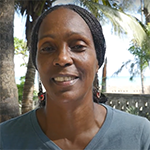
|
Nyawira Muthiga
Director (GCP) Kenya Marine Program
Nyawira Muthiga is a Conservation Zoologist with the Wildlife Conservation Society, as the program director she oversees the running of activities at the Mombasa office. Activities that she is involved in include research and conservation programs on coral reefs, sea turtles, sea cucumbers and other threatened species and ecosystems. She liaise with the government and communities associated with marine resource use and management and play other coordinating roles including leading the regional coral reef task force
|
|
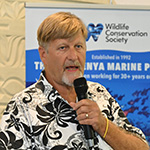
|
Dr. Tim McClanahan
Senior Conservation Zoologist (GCP)
Dr. Timothy McClanahan is a leading environmental and marine conservation scientist and the Director of Marine Science for WCS Global Marine Programs. With over 33 years at WCS, he has advanced research on coral reefs, fisheries, and social-ecological systems, focusing on marine protected areas, reef restoration, and community-based management.
He is also the founder of Kenya’s annual Fishers’ Forum, now in its 24th year, which promotes collaboration between fishers, communities, and stakeholders. Dr. McClanahan holds a BA in Biology and an MSc and PhD in Environmental Engineering. A Pew and WIOMSA Fellow, he has authored over 530 publications and ranks among the top 100 global scientists in ecology and evolution.
|
|
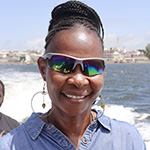
|
Caroline Abunge
Research Scientiist - Social
Caroline A. Abunge is a seasoned research scientist with 17 years of experience in socioeconomics and stakeholder engagement. She specializes in social data collection, analysis, and management, as well as training data collectors and developing questionnaires. As the Internal Review Board (IRB) and Social Safeguards point person for Kenya, she ensures ethical research standards and safeguards implementation. Caroline has contributed to over 10 social projects and published extensively on fisheries management and marine conservation. Her work supports community engagement and informed decision-making in marine resource governance.
|
|
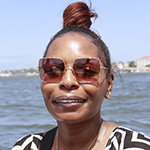
|
Catherine Kiecha
Director Finance and Administration
With over 14 years of experience in finance and grants management, Catherine Kiecha thrives at the intersection of numbers and purpose. She’s worked across diverse regions and donor landscapes to ensure programs run smoothly, resources are well-managed, and reporting is timely and transparent. Passionate about systems that work and people who care, Catherine enjoys bringing structure and clarity to complex operations.
|
|
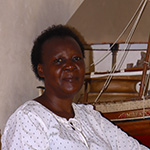
|
Jane Nyanapah
Administration Manager - Kenya Marine Program
Jane Nyanapah is a community development professional with 8+ years at WCS. As Program Administration Manager for the Kenya Marine Program, she oversees operations, logistics, administration, library management, and research support. She holds a Bachelor's in Development Studies from Mount Kenya University, specializing in community dialogue and sustainable development. Jane has co-authored research papers on marine conservation and climate change, reports on ICT-driven empowerment, and sustainable poverty alleviation, emphasizing technology, environmental sustainability, and community resilience. Her work bridges research and conservation, supporting evidence-based decision-making in marine resource management.
|
|
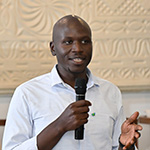
|
Jesse Kiprono
Marine Research Scientist
Jesse Kiprono Kosgei is a distinguished marine scientist who serves as an Ecological Scientist at the WCS Kenya Marine Program. With over twelve years of experience in fisheries, socioeconomics, and marine ecology, Jesse leads the marine fish catch and stock assessment research components at the program. Additionally, he plays a key role as the welfare secretariat. Holding a Master’s degree in Fisheries from Pwani University, Jesse has significantly contributed to the scientific community with five co-authored peer-reviewed publications on fisheries and ecology. He has also supported numerous other peer-reviewed publications in ecology, fisheries, and social economics. His work focuses on building science-based policies and management initiatives, aiming to address the complexities of managing common-pool resources effectively.
|
|
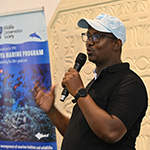
|
Jillo Katelo Wato
Project Coordinator - MACP Project
Jillo Wato, is a seasoned conservation biologist with over 25 years of experience in wildlife protection, research, and community empowerment. Currently serving as the Project Coordinator for MACP at WCS Marine Program Kenya under the GCP-Africa initiative, he specializes in small-scale fisheries management.
Jillo holds an MSc in Environmental Science from Pwani University, with expertise in marine and terrestrial ecology, community empowerment, and management. His career spans roles such as KWS Ranger, Research Scientist, and Director of Programs & Administration at Kivulini Trust, an NGO supporting 14 ethnic communities in Northern Kenya. He has also contributed to marine research at Kisite-Mpunguti Marine Park and served as a KWS Board of Trustees member.
A certified WIOCOMPAS PRO MPA Level 2 professional and a Trainer of Trainers in Coral Reef Resilience, Jillo has played a key role in Kenya’s Coral Reef and Seagrass Conservation Strategy. His academic contributions include research on crayfish dietary diversity and co-authoring a study on marine protected areas for top predators.
In recognition of his exemplary service, he was awarded the Silver Star of Kenya (SS) by President Mwai Kibaki. Additionally, he is an accomplished scuba diver, and a dedicated conservation advocate committed to sustainable marine resource management.
|
|
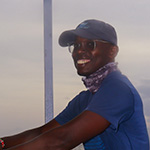
|
Peter Musembi
Marine Research Scientist
Peter Musembi is a marine scientist under the Miamba Yetu: Sustainable Reef Investments programme, specializing in monitoring and evaluation, as well as providing technical support for various conservation interventions. With over a decade of experience in marine science, Peter has been actively involved in research on coral reef and seagrass meadow ecology, small-scale fisheries, and sharks and rays.
Holding a BSc in Applied Aquatic Sciences from Egerton University, Peter focused on the ecology and management of inland and marine water systems. He further specialized in small-scale fisheries in seagrass meadows during his MSc in Fisheries Management at Pwani University.
Beyond field research, Peter contributes to the marine program through underwater ecological monitoring and data analysis. His research interests include coral reef biodiversity, reef fish ecology, small-scale fisheries, and ecological statistics. Peter has authored and co-authored several scientific papers on coral reef ecology, sharks and rays, small-scale fisheries, and seagrass meadows.
|
|